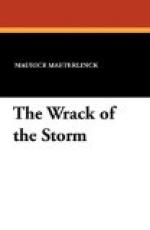that posterity should face, would have found its definite
solution, once and for all, in a happiness which now
perhaps even our sons and grandsons will not realize.
We know that the disappearance of two or three million
young existences, cut down when they were on the point
of bearing fruit, will leave in history a void that
will not be easily filled, even as we know that among
those dead were mighty intellects, treasures of genius
which will not come back again and which contained
inventions and discoveries that will now perhaps be
lost to us for centuries. We know that we shall
never grasp the consequences of this thrusting back
of progress and of this unprecedented devastation.
But, granting all this, it is a good thing to recover
our balance and stand upon our feet. There is
no irreparable loss. Everything is transformed,
nothing perishes and that which seems to be hurled
into destruction is not destroyed at all. Our
moral world, even as our physical world, is a vast
but hermetically sealed sphere, whence naught can issue,
whence naught can fall, to be dissolved in space.
All that exists, all that comes into being upon this
earth remains there and bears fruit; and the most
appalling wastage is but material or spiritual riches
flung away for an instant, to fall to the ground again
in a new form. There is no escape or leakage,
no filtering through cracks, no missing the mark,
not even waste or neglect. All this heroism poured
out on every side does not leave our planet; and the
reason why the courage of our fighters seems so general
and yet so extraordinary is that all the might of
the dead has passed into the survivors. All those
forces of wisdom, patience, honour and self-sacrifice
which increase day by day and which we ourselves,
who are far from the field of danger, feel rising
within us without knowing whence they come are nothing
but the souls of the heroes gathered and absorbed
by our own souls.
3
It is well at times to contemplate invisible things
as though we saw them with our eyes. This was
the aim of all the great religions, when they represented
under forms appropriate to the civilization of their
day, the latent, deep, instinctive, general and essential
truths which are the guiding principles of mankind.
All have felt and recognized that loftiest of all
truths, the communion of the living and the dead,
and have given it various names designating the same
mysterious verity: the Christians know it as
revival of merit, the Buddhists as reincarnation,
or transmigration of souls, and the Japanese as Shintoism,
or ancestor-worship. The last are more fully convinced
than any other nation that the dead do not cease to
live and that they direct all our actions, are exalted
by our virtues and become gods.
Lafcadio Hearn, the writer who has most closely studied
and understood that wonderful ancestor-worship, says:




